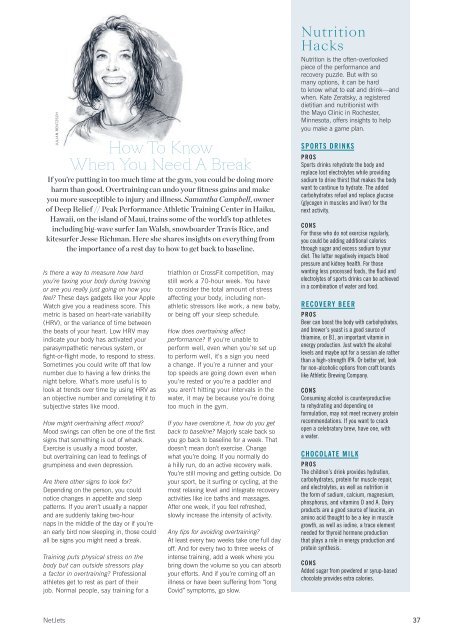You also want an ePaper? Increase the reach of your titles
YUMPU automatically turns print PDFs into web optimized ePapers that Google loves.
JULIAN RENTZSCH<br />
How To Know<br />
When You Need A Break<br />
If you’re putting in too much time at the gym, you could be doing more<br />
harm than good. Overtraining can undo your fitness gains and make<br />
you more susceptible to injury and illness. Samantha Campbell, owner<br />
of Deep Relief // Peak Performance Athletic Training Center in Haiku,<br />
Hawaii, on the island of Maui, trains some of the world’s top athletes<br />
including big-wave surfer Ian Walsh, snowboarder Travis Rice, and<br />
kitesurfer Jesse Richman. Here she shares insights on everything from<br />
the importance of a rest day to how to get back to baseline.<br />
Is there a way to measure how hard<br />
you’re taxing your body during training<br />
or are you really just going on how you<br />
feel? These days gadgets like your Apple<br />
Watch give you a readiness score. This<br />
metric is based on heart-rate variability<br />
(HRV), or the variance of time between<br />
the beats of your heart. Low HRV may<br />
indicate your body has activated your<br />
parasympathetic nervous system, or<br />
fi ght-or-fl ight mode, to respond to stress.<br />
Sometimes you could write off that low<br />
number due to having a few drinks the<br />
night before. What’s more useful is to<br />
look at trends over time by using HRV as<br />
an objective number and correlating it to<br />
subjective states like mood.<br />
How might overtraining affect mood?<br />
Mood swings can often be one of the fi rst<br />
signs that something is out of whack.<br />
Exercise is usually a mood booster,<br />
but overtraining can lead to feelings of<br />
grumpiness and even depression.<br />
Are there other signs to look for?<br />
Depending on the person, you could<br />
notice changes in appetite and sleep<br />
patterns. If you aren’t usually a napper<br />
and are suddenly taking two-hour<br />
naps in the middle of the day or if you’re<br />
an early bird now sleeping in, those could<br />
all be signs you might need a break.<br />
Training puts physical stress on the<br />
body but can outside stressors play<br />
a factor in overtraining? Professional<br />
athletes get to rest as part of their<br />
job. Normal people, say training for a<br />
triathlon or CrossFit competition, may<br />
still work a 70-hour week. You have<br />
to consider the total amount of stress<br />
affecting your body, including nonathletic<br />
stressors like work, a new baby,<br />
or being off your sleep schedule.<br />
How does overtraining affect<br />
performance? If you’re unable to<br />
perform well, even when you’re set up<br />
to perform well, it’s a sign you need<br />
a change. If you’re a runner and your<br />
top speeds are going down even when<br />
you’re rested or you’re a paddler and<br />
you aren’t hitting your intervals in the<br />
water, it may be because you’re doing<br />
too much in the gym.<br />
If you have overdone it, how do you get<br />
back to baseline? Majorly scale back so<br />
you go back to baseline for a week. That<br />
doesn’t mean don’t exercise. Change<br />
what you’re doing. If you normally do<br />
a hilly run, do an active recovery walk.<br />
You’re still moving and getting outside. Do<br />
your sport, be it surfi ng or cycling, at the<br />
most relaxing level and integrate recovery<br />
activities like ice baths and massages.<br />
After one week, if you feel refreshed,<br />
slowly increase the intensity of activity.<br />
Any tips for avoiding overtraining?<br />
At least every two weeks take one full day<br />
off. And for every two to three weeks of<br />
intense training, add a week where you<br />
bring down the volume so you can absorb<br />
your efforts. And if you’re coming off an<br />
illness or have been suffering from “long<br />
Covid” symptoms, go slow.<br />
Nutrition<br />
Hacks<br />
Nutrition is the often-overlooked<br />
piece of the performance and<br />
recovery puzzle. But with so<br />
many options, it can be hard<br />
to know what to eat and drink—and<br />
when. Kate Zeratsky, a registered<br />
dietitian and nutritionist with<br />
the Mayo Clinic in Rochester,<br />
Minnesota, offers insights to help<br />
you make a game plan.<br />
SPORTS DRINKS<br />
PROS<br />
Sports drinks rehydrate the body and<br />
replace lost electrolytes while providing<br />
sodium to drive thirst that makes the body<br />
want to continue to hydrate. The added<br />
carbohydrates refuel and replace glucose<br />
(glycogen in muscles and liver) for the<br />
next activity.<br />
CONS<br />
For those who do not exercise regularly,<br />
you could be adding additional calories<br />
through sugar and excess sodium to your<br />
diet. The latter negatively impacts blood<br />
pressure and kidney health. For those<br />
wanting less processed foods, the fluid and<br />
electrolytes of sports drinks can be achieved<br />
in a combination of water and food.<br />
RECOVERY BEER<br />
PROS<br />
Beer can boost the body with carbohydrates,<br />
and brewer’s yeast is a good source of<br />
thiamine, or B1, an important vitamin in<br />
energy production. Just watch the alcohol<br />
levels and maybe opt for a session ale rather<br />
than a high-strength IPA. Or better yet, look<br />
for non-alcoholic options from craft brands<br />
like Athletic Brewing Company.<br />
CONS<br />
Consuming alcohol is counterproductive<br />
to rehydrating and depending on<br />
formulation, may not meet recovery protein<br />
recommendations. If you want to crack<br />
open a celebratory brew, have one, with<br />
a water.<br />
CHOCOLATE MILK<br />
PROS<br />
The children’s drink provides hydration,<br />
carbohydrates, protein for muscle repair,<br />
and electrolytes, as well as nutrition in<br />
the form of sodium, calcium, magnesium,<br />
phosphorus, and vitamins D and A. Dairy<br />
products are a good source of leucine, an<br />
amino acid thought to be a key in muscle<br />
growth, as well as iodine, a trace element<br />
needed for thyroid hormone production<br />
that plays a role in energy production and<br />
protein synthesis.<br />
CONS<br />
Added sugar from powdered or syrup-based<br />
chocolate provides extra calories.<br />
NetJets<br />
37


















